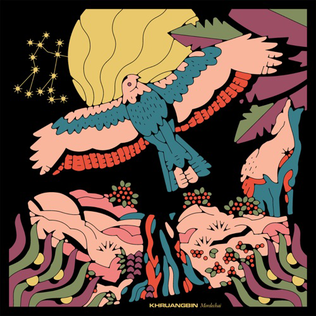Mordechai Review
Vincent Lucarelli
Published

Dating back to a time before the Beatles, when the Ventures and the Lively Ones were getting radio airplay, instrumental rock has always been part of the American musical landscape in some form.
Still, success and exposure for a group like Houston-based trio Khruangbin is rare in the 21st
century. Beginning with 2015’s The Universe Smiles upon You and continuing in 2018’s Con
Todo El Mundo, the group has propagated a sound and a modus operandi unlike anyone else in
the popular or even alternative sphere. The first thing one notices when visiting these albums is
the sprawling instrumental compositions like “August Twelve” on The Universe Smiles upon
You or “Como Me Quieres” on Con Todo El Mundo. These spacious, reverb drenched, largely
guitar-based pieces recall a more laid-back and mellow version of surf-rock king Dick Dale, or
the improvisations of someone like Sandy Bull.
Vocal-based pieces show up as well, such as “White Gloves” on the Universe Smiles Upon You
or “Friday Morning” on Con Todo El Mundo, but the lyrical content itself often consists of
wordless exaltations, or just a few repeated lines that are sung in a chanted, trance-like state and
placed so far down in the mix that they sound far away and subordinate to the instrumental
improvisation.
This is all tied into a bow by the international influences that tinge their particular brand of genre
bending rock. The Universe Smiles upon You is more of a meditation on the luk thung music of
Thailand (the country where the word Khruangbin meaning “airplane,” originates) while the Con
Todo El Mundo plumbs more Spanish and Middle Eastern influences.
These trends are both continued and tweaked in the group’s third effort, Mordechai, which was
released in June 2020. Yes, instrumental compositions are still there; “Father Bird, Mother Bird”
is a classic Khruangbin piece in this vein containing a very wet sounding guitar a la surf
luminaries like the Astronauts or the Pyramids under some lilting riffs from lead guitarist Mark
Speer. This is notably the only fully instrumental track on the album.
“First Class” and “One to Remember” continue in the vocally subordinate vein previously
mentioned. For example, “First Class” mainly consists of repetition of the word “solamente.”
Here, words are not used as lyrics per se, but mainly as a means of creating texture and
establishing an atmosphere around the guitar lines and is done to perfection.
What stands out on Mordechai though are songs like “Time (You and I)”, the lead single off the
album, and “So We Won’t Forget.” These are without a doubt the strongest songs Khruangbin
have released from a lyrical standpoint. Though they keep an emphasis on simple constructions
and hypnotic repeated phrasing, these songs show a mature evolution of their songwriting to
elucidate certain themes. These themes encompass a certain nostalgia that was implicit, at least
for me, in their previous work such as “August Twelve.” The hook of “Time (You and I)” goes
“That’s life/ If we had more time/ We could live forever/ Just you and I/ We could be together.”,
while “So We Won’t Forget” deals with the prospect of remembrance and writing something
down so it is not forgotten; As a 22 year-old senior that is about to graduate, I have lived many
lives up to this point and themes like this have always been and remain poignant for me, which
may be why I connect with this album and Khruangbin in general.
An early 2020 collaboration with neo-soul star Leon Bridges on the Texas Sun EP could
certainly have launched the group to new heights of musical maturity. More likely, it is the
wisdom that comes with a third album, and the honing of a sound that comes with that, that
drove Khruangbin to infinity and beyond here.
Whether it is Dylan with The Times They Are A Changin, Radiohead with Ok Computer, or
Ariana Grande with Dangerous Woman, the third album is traditionally where an artist comes
into who they really are and crafts an individual identity. That is definitely the case for
Khruangbin and Mordechai.

